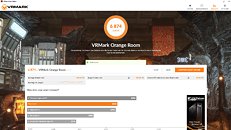Raevenlord
News Editor
- Joined
- Aug 12, 2016
- Messages
- 3,755 (1.16/day)
- Location
- Portugal
| System Name | The Ryzening |
|---|---|
| Processor | AMD Ryzen 9 5900X |
| Motherboard | MSI X570 MAG TOMAHAWK |
| Cooling | Lian Li Galahad 360mm AIO |
| Memory | 32 GB G.Skill Trident Z F4-3733 (4x 8 GB) |
| Video Card(s) | Gigabyte RTX 3070 Ti |
| Storage | Boot: Transcend MTE220S 2TB, Kintson A2000 1TB, Seagate Firewolf Pro 14 TB |
| Display(s) | Acer Nitro VG270UP (1440p 144 Hz IPS) |
| Case | Lian Li O11DX Dynamic White |
| Audio Device(s) | iFi Audio Zen DAC |
| Power Supply | Seasonic Focus+ 750 W |
| Mouse | Cooler Master Masterkeys Lite L |
| Keyboard | Cooler Master Masterkeys Lite L |
| Software | Windows 10 x64 |
Futuremark, the Finnish software development company best known for its 3DMark benchmarking suite, has just announced the availability of another benchmark suite. Aptly named VRMark, this suite teste your system's ability to run VR games and experiences, since the performance required for VR is much higher than for typical PC games - just consider that the recommended frame-rate for an optimal VR experience stands at 90fps. Run VRMark to see if your PC has what it takes to deliver a great VR experience on the HTC Vive and Oculus Rift. VRMark benchmark tests run on your monitor, no headset required. If your PC passes, it's ready for the two most popular VR systems available today.


The VRMark Orange Room benchmark shows the impressive level of detail that can be achieved on a PC that meets the recommended hardware requirements for the HTC Vive and Oculus Rift. If your PC passes this test, it's ready for the two most popular VR systems available today.
You can run the Orange Room as a benchmark to measure performance objectively, or as an Experience, which lets you judge the rendering quality with your own eyes.
You can run the Orange Room benchmark and experience on your monitor in Desktop mode, no headset required, or on a connected headset in HMD mode. VRMark supports Windows 10 64-bit, Windows 8.1 64-bit, as well as Windows 7 with Service Pack 1 64-bit, and there are two versions of it available: a free edition, VRMark Basic Edition, which includes the Orange Room benchmark and its experience mode; and a $19.99 Advanced Edition, which additionally unlocks access to the Blue Room benchmark for high-performance PCs, shows more detailed results and hardware monitoring charts, allows the exploration of both the Orange and Blue rooms in Experience mode, and adds the ability to customize your runs. Click the below link to download the Free version.




DOWNLOAD: Futuremark VRMark v1.0.1227 (1007.3 MB)
View at TechPowerUp Main Site


The VRMark Orange Room benchmark shows the impressive level of detail that can be achieved on a PC that meets the recommended hardware requirements for the HTC Vive and Oculus Rift. If your PC passes this test, it's ready for the two most popular VR systems available today.
You can run the Orange Room as a benchmark to measure performance objectively, or as an Experience, which lets you judge the rendering quality with your own eyes.
You can run the Orange Room benchmark and experience on your monitor in Desktop mode, no headset required, or on a connected headset in HMD mode. VRMark supports Windows 10 64-bit, Windows 8.1 64-bit, as well as Windows 7 with Service Pack 1 64-bit, and there are two versions of it available: a free edition, VRMark Basic Edition, which includes the Orange Room benchmark and its experience mode; and a $19.99 Advanced Edition, which additionally unlocks access to the Blue Room benchmark for high-performance PCs, shows more detailed results and hardware monitoring charts, allows the exploration of both the Orange and Blue rooms in Experience mode, and adds the ability to customize your runs. Click the below link to download the Free version.




DOWNLOAD: Futuremark VRMark v1.0.1227 (1007.3 MB)
View at TechPowerUp Main Site
Last edited:








